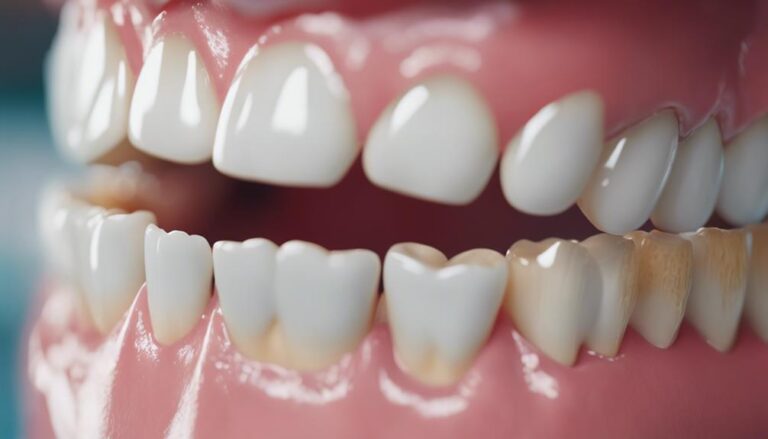Poor oral hygiene allows bacteria to accumulate, forming plaque that irritates gums and leads to inflammation. Without proper brushing, flossing, and mouthwash use, this plaque hardens into tartar, causing gum disease. Signs like redness and bleeding indicate gingivitis, which can progress to more severe periodontitis without intervention. Prevent gum disease by maintaining good oral hygiene, a balanced diet, and regular dental visits. Various factors like smoking, diabetes, and genetics can worsen gum health. Understanding these connections is crucial for preserving overall well-being and preventing serious complications.
Key Takeaways
- Poor oral hygiene allows plaque to accumulate, leading to gum inflammation.
- Bacteria in plaque trigger an inflammatory response, damaging gum tissue.
- Neglecting brushing and flossing promotes bacterial growth, causing gum disease.
- Untreated gum inflammation progresses to gingivitis and, if severe, to periodontitis.
- Lack of proper oral care results in tartar formation, worsening gum disease.
Importance of Oral Hygiene
Maintaining good oral hygiene is essential for preventing gum disease and maintaining overall oral health. Brushing techniques play a vital role in keeping your teeth and gums healthy. It’s recommended to brush your teeth at least twice a day for two minutes each time, using fluoride toothpaste and a soft-bristled toothbrush. Proper brushing techniques involve gentle circular motions to effectively remove plaque and food particles without damaging the gums.
Equally important is the practice of flossing. Flossing helps to clean the areas between teeth where a toothbrush can’t reach, preventing plaque buildup and reducing the risk of gum disease. It’s advised to floss once a day, gently sliding the floss up and down the sides of each tooth to remove debris and plaque. Incorporating flossing into your daily oral hygiene routine along with proper brushing techniques is key to promoting healthy gums and preventing gum disease.
Plaque Build-Up
To understand the importance of plaque build-up in relation to gum disease, it is important to recognize that plaque serves as a primary factor contributing to oral health issues. Plaque is a sticky film of bacteria that forms on teeth, particularly along the gumline. If not removed through proper oral hygiene practices, plaque can harden into tartar, leading to gum irritation and inflammation. This can eventually progress to gum disease if left untreated.
| Plaque Build-Up Effects | Prevention Strategies |
|---|---|
| Irritates Gums | Brush teeth twice daily with fluoride toothpaste |
| Causes Inflammation | Floss daily to remove plaque between teeth |
| Leads to Gum Disease | Rinse with an antiseptic mouthwash to reduce plaque |
Maintaining good gum health involves regular dental check-ups, professional cleanings, and adopting effective plaque prevention techniques. By staying proactive in plaque removal and overall oral hygiene, individuals can greatly reduce their risk of developing gum disease and promote excellent oral health.
Bacteria and Inflammation
The relationship between bacteria and inflammation in the context of gum disease is a critical aspect of understanding oral health complications. When bacteria accumulate in the mouth due to poor oral hygiene, they can multiply rapidly, leading to bacteria growth. These bacteria can then form a sticky film called plaque, which if not properly removed through regular brushing and flossing, can irritate the gums.
As the plaque remains on the teeth, it triggers an inflammatory response from the body’s immune system. This inflammation response is the body’s way of trying to fight off the harmful bacteria present in the plaque. However, chronic inflammation can damage the gums and surrounding tissues over time, leading to gum disease.
Therefore, it’s essential to maintain good oral hygiene practices to prevent excessive bacteria growth and the subsequent inflammation response. Regular dental check-ups, proper brushing techniques, and flossing can help control bacteria levels and reduce the risk of developing gum disease.
Gingivitis Warning Signs
Regularly monitoring your gums for early warning signs of gingivitis is essential for maintaining excellent oral health. One of the key indicators of gingivitis is gum inflammation, which may manifest as redness, swelling, and tenderness. Additionally, you may notice that your gums easily bleed, especially during brushing or flossing.
Proper dental flossing technique is vital in preventing gingivitis as it helps remove plaque and food particles from between the teeth and along the gumline.
Incorporating mouthwash into your oral hygiene routine can also provide benefits in treating gingivitis. Antimicrobial mouthwashes can help reduce the amount of bacteria in the mouth, which in turn can alleviate gum inflammation. When selecting a mouthwash, look for products that are specifically designed to combat gingivitis and promote gum health.
Periodontitis Progression
As gum inflammation progresses unchecked, gingivitis can advance into a more severe condition known as periodontitis. Periodontitis is characterized by the inflammation and infection of the gums, ligaments, and bones that support the teeth. This condition can be categorized into different stages based on the severity of the damage caused to the tissues supporting the teeth. The stages of periodontitis range from mild (initial stage) to moderate (established periodontitis) and severe (advanced periodontitis).
Preventing gum disease progression to periodontitis involves maintaining good oral hygiene practices. Regular brushing, flossing, and dental check-ups are essential in preventing the build-up of plaque and tartar that can lead to gum inflammation. Additionally, a balanced diet low in sugars and high in nutrients can support gum health.
In cases where gingivitis is already present, prompt treatment and proper management can help prevent its progression to periodontitis. Understanding the stages of periodontitis and implementing preventive measures is vital in preserving oral health and preventing the advancement of gum disease.
Receding Gums
Maintaining proper oral hygiene practices is crucial in preventing the occurrence of receding gums. Receding gums, also known as gum recession, happen when the gum tissue surrounding the teeth wears away or pulls back, exposing more of the tooth or the tooth’s root.
To prevent receding gums, consider the following:
- Regular Dental Check-ups: Schedule routine visits to your dentist for early detection and intervention.
- Gentle Brushing Technique: Use a soft-bristled toothbrush and gentle, circular motions.
- Flossing Daily: Clean between your teeth to remove plaque and prevent gum disease.
- Avoid Tobacco Products: Smoking can contribute to gum recession and other oral health issues.
- Professional Cleanings: Regular cleanings by a dental hygienist help remove plaque and tartar buildup.
In case gum recession occurs, various treatments can help, such as gum grafts, scaling and root planing, and the use of desensitizing agents. By taking preventive measures and seeking appropriate treatment, individuals can effectively manage receding gums and maintain good oral health.
Tooth Loss Risk
To minimize the risk of tooth loss, it’s essential to prioritize proper oral hygiene practices and regular dental check-ups. Tooth loss prevention starts with maintaining healthy gums. Gum disease, if left untreated, can lead to tooth loss. The bacteria that cause gum disease can damage the tissues surrounding the teeth, eventually causing them to loosen and fall out.
Gum disease treatment is vital in preventing tooth loss. Regular professional cleanings help remove plaque and tartar buildup that can contribute to gum disease. In cases of advanced gum disease, treatments like scaling and root planing may be necessary to clean below the gum line and promote gum healing.
In addition to professional treatments, daily oral hygiene habits such as brushing twice a day, flossing, and using an antiseptic mouthwash can help prevent gum disease and ultimately reduce the risk of tooth loss. Remember, a healthy mouth is key to maintaining a beautiful smile for years to come.
Bad Breath Connection
Improving oral hygiene practices can help address the connection between bad breath and gum disease. Bad breath, also known as halitosis, is often a sign of poor oral health and can be linked to gum disease. To combat bad breath and prevent its association with gum disease, consider the following:
- Tongue Scraping: Cleaning the surface of the tongue helps remove bacteria and food particles that can contribute to bad breath.
- Proper Brushing Technique: Brushing not just your teeth but also your tongue and gums can eliminate odor-causing bacteria.
- Regular Dental Check-ups: Dental visits allow for professional cleaning and early detection of any oral health issues.
- Hydration: Drinking an adequate amount of water helps keep your mouth moist and washes away food particles.
- Balanced Diet: Eating a diet rich in fruits and vegetables can help prevent gum disease and bad breath by providing essential nutrients for oral health.
Oral Health Routine
Developing a consistent oral health routine is essential for maintaining healthy gums and teeth. Proper brushing techniques are vital in removing plaque, a sticky film of bacteria that can lead to gum disease. It’s recommended to brush at least twice a day using a soft-bristled toothbrush and fluoride toothpaste. When brushing, hold the toothbrush at a 45-degree angle and use gentle, circular motions to clean the front, back, and chewing surfaces of the teeth. Pay special attention to the gumline to prevent plaque buildup.
In addition to brushing, flossing is a key component of a good oral health routine. Flossing helps remove food particles and plaque from between the teeth and along the gumline, where a toothbrush can’t reach. By flossing once a day, you can reduce the risk of gum disease and cavities. To floss effectively, use a piece of floss about 18 inches long and gently guide it between each tooth in a C shape to make sure you clean below the gumline. Incorporating proper brushing techniques and regular flossing into your daily routine can help maintain healthy gums and prevent gum disease.
Professional Cleanings
How often should professional cleanings be scheduled to maintain peak oral health?
Regular dental check-ups for professional cleanings are essential for preventing gum disease and maintaining top oral health. Here are some key points to keep in mind:
- Frequency: Professional cleanings should generally be scheduled every six months, but this can vary based on individual oral health needs.
- Deep Cleaning: Professional cleanings involve scaling and root planing to remove plaque and tartar buildup, which can’t be achieved through regular brushing and flossing alone.
- Prevention: These cleanings help prevent gum disease by addressing early signs of inflammation and infection.
- Monitoring: Regular cleanings allow dentists to monitor your oral health and detect any issues early on.
- Education: During these appointments, dental professionals can provide guidance on proper flossing techniques and personalized oral care tips tailored to your needs.
Healthy Diet Impact
Maintaining a balanced and nutritious diet greatly influences oral health and overall well-being. Nutritional habits play a significant role in preventing gum disease and maintaining healthy gums. Consuming a diet rich in vitamins, minerals, and antioxidants supports the immune system’s ability to fight off bacteria that cause gum inflammation.
Opting for whole foods such as fruits, vegetables, lean proteins, and whole grains can promote gum health by providing essential nutrients like vitamin C, which is necessary for collagen production in the gums. On the other hand, a diet high in sugars and processed foods can lead to an overgrowth of harmful bacteria in the mouth, increasing the risk of gum disease.
Making conscious dietary choices is key to preventing oral health issues. By prioritizing a nutrient-dense diet and limiting sugary snacks and beverages, individuals can positively impact their oral health and reduce the likelihood of developing gum disease.
Smoking and Gum Disease
What impact does smoking have on the development of gum disease?
Smoking is a significant risk factor for gum disease, as it weakens the immune system and reduces blood flow to the gums, making it harder for the body to fight off infections.
Here are five key points to take into account:
- Increased Risk: Smokers are two times more likely to develop gum disease compared to non-smokers.
- Delayed Healing: Smoking can impair the healing process after dental procedures, leading to complications in gum disease treatment.
- Masking Symptoms: Smoking can conceal the signs of gum disease, such as bleeding gums, making it harder to detect the condition in its early stages.
- Impact on Treatment: Smokers may respond less effectively to gum disease treatments, requiring more aggressive interventions for successful outcomes.
- Link to Oral Cancer: Smoking isn’t only a risk factor for gum disease but also significantly raises the risk of developing oral cancer.
Considering these factors, smoking cessation is vital for preventing gum disease and reducing the risk of oral cancer.
Diabetes and Oral Health
Diabetes significantly impacts oral health by affecting the body’s ability to control blood sugar levels, leading to an increased risk of gum disease and other dental complications. Uncontrolled blood sugar levels in individuals with diabetes can weaken the immune system‘s ability to fight off bacterial infections, including those in the mouth. This compromised immune response makes diabetic individuals more susceptible to gum disease, a condition characterized by inflammation and infection of the gums surrounding the teeth.
Additionally, diabetes can contribute to insulin resistance, a condition where the body’s cells become less responsive to insulin. Insulin plays an important role in regulating blood sugar levels, and when resistance occurs, it can lead to elevated blood sugar levels, further exacerbating the risk of gum disease and tooth decay. As a result, individuals with diabetes must maintain regular dental visits to monitor their oral health closely and prevent potential complications associated with gum disease.
Stress Effects
The impact of stress on oral health is a significant factor that should be taken into account, as it can worsen existing conditions like gum disease and lead to further complications. Stress affects our overall well-being, including our oral health. Here are some key points to take into consideration:
- Increased Inflammation: Stress can contribute to increased inflammation in the body, including the gums, exacerbating gum disease.
- Weakened Immune Response: High stress levels can weaken the immune system, making it harder for the body to fight off infections like gum disease.
- Bruxism: Stress may lead to teeth grinding or clenching, known as bruxism, which can damage the teeth and increase the risk of gum problems.
- Poor Self-Care Habits: During times of stress, individuals may neglect their oral hygiene routines, leading to a higher likelihood of gum disease.
- Importance of Stress Management and Self-Care Practices: Incorporating stress management techniques and self-care practices can help reduce the impact of stress on oral health and overall well-being. Prioritizing self-care can have a positive impact on oral hygiene and prevent complications related to gum disease.
Genetics Influence
Genetic factors play a pivotal role in influencing an individual’s susceptibility to gum disease and overall oral health. Research has shown that genetic predisposition can greatly impact the likelihood of developing gum disease. While oral care habits, such as regular brushing and flossing, remain vital in preventing oral health issues, genetic factors can still play a substantial role in determining an individual’s oral health outcomes.
Individuals with a family history of gum disease are at a higher risk of developing the condition themselves, even if they maintain excellent oral hygiene practices. This suggests that genetic predisposition can override the benefits of good oral care habits in some cases. Understanding one’s genetic susceptibility to gum disease can help individuals take proactive steps to prevent its onset or manage it more effectively.
Therefore, while maintaining proper oral hygiene practices is essential for oral health, individuals with a genetic predisposition to gum disease should be particularly vigilant in their dental care routine and consider seeking more frequent dental check-ups to prevent and detect any issues early on.
Frequently Asked Questions
Can Poor Oral Hygiene Affect My Overall Health Beyond Gum Disease?
Neglecting oral health impacts more than just gums. Poor hygiene habits can affect overall health. Research links it to heart disease and weakened immune system. Regular dental care is essential for maintaining good health.
Are There Any Specific Foods That Worsen Gum Disease?
When it comes to dietary habits and oral health, certain foods can worsen gum disease. For instance, sugary snacks can fuel bacteria growth in the mouth, leading to inflammation and gum problems. Monitoring nutrition is vital.
Can Stress Make Gum Disease Symptoms Worse?
Stress management plays a vital role in gum health. Lifestyle habits like regular exercise and proper oral hygiene can help alleviate stress, potentially reducing gum disease symptoms. Prioritizing oral health and stress reduction can benefit overall well-being.
How Does Genetics Play a Role in Gum Disease Development?
Like a genetic blueprint, our genes impact gum disease risk. Research shows certain genetic variations can make some individuals more susceptible. Understanding these genetic factors can help tailor preventive strategies and treatments for better oral health.
Is There a Link Between Diabetes and Gum Disease Progression?
In managing diabetes, it’s important to understand the link to gum disease progression. Poor diabetes management can exacerbate oral health issues, leading to increased risk of gum disease. Regular dental check-ups are essential for monitoring and addressing these concerns.
Conclusion
To sum up, neglecting oral hygiene can have serious consequences for your gum health.
It’s vital to keep in mind that poor oral hygiene can lead to gum disease, which can be harmful to your overall well-being.
By taking care of your teeth and gums through regular brushing, flossing, and dental check-ups, you can prevent the development of gum disease and guarantee a healthier smile for years to come.
Remember, a little effort now can save you a lot of trouble later on.






